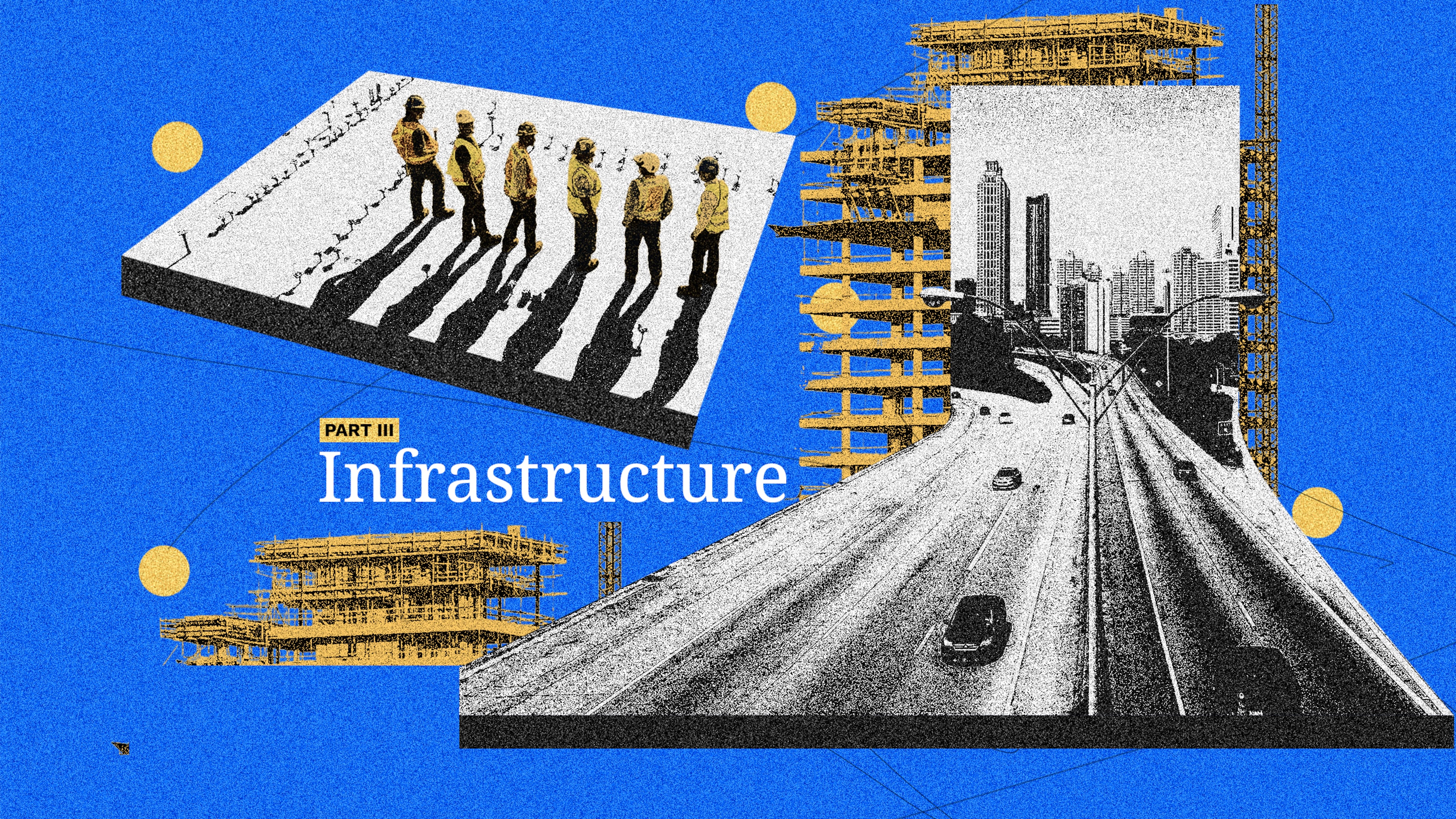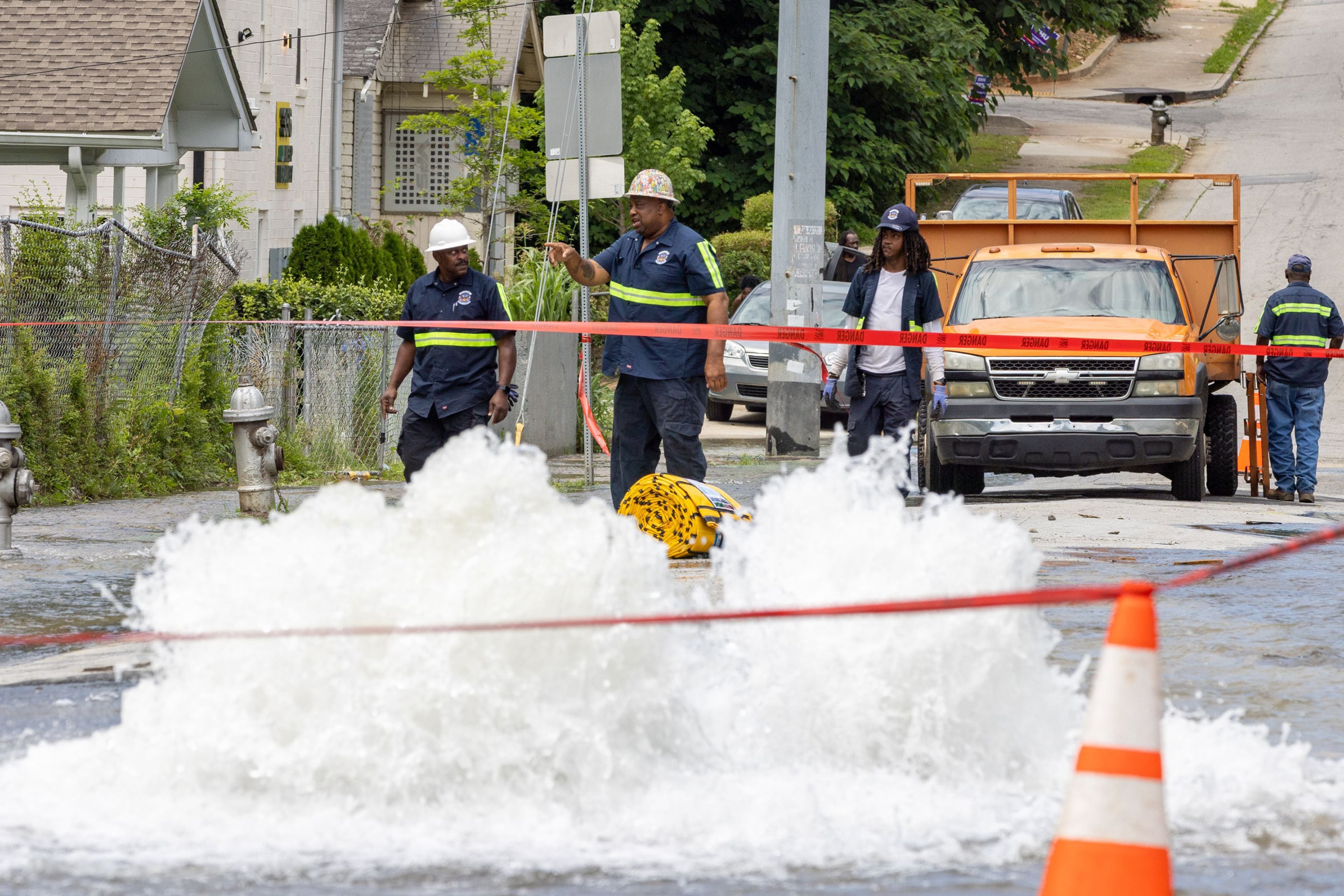Fixing broken infrastructure one of city’s biggest challenges for next mayor

Atlanta Mayor Andre Dickens inherited a wide range of infrastructure problems when he took office four years ago, from dilapidated streets to a crumbling water system that led to severe outages last year.
And with the World Cup on the horizon, experts say the city needs to ramp up its capital project delivery to ensure Atlanta can handle the hundreds of thousands of visitors expected.
It will be one of the mayor’s biggest challenges if he wins reelection against three challengers Nov. 4.
But critics say the soccer tournament deadline for street and water improvements is a lofty goal, and it is unlikely that many of the infrastructure-related projects Dickens has in mind will be completed by the time he ends an expected second term in 2030.
Ahead of next summer’s tournament, downtown streets are scheduled to be remade with $120 million worth of new asphalt, painted crosswalks, streetlights and sidewalks. Much of the Centennial Yards development is supposed to be finished. The water system must successfully handle the demands of a surge of visitors totaling more than half the city’s population.

All of that is on top of the promises to end homelessness downtown and dramatically improve transit.
“The World Cup is a magical deadline that the city’s going to do all of these wonderful things,” said Jean-Paul Addie, a professor in the Urban Studies Institute at Georgia State University’s Andrew Young School of Policy Studies. “It’s a bit of a stretch.”
Dickens did not respond to multiple interview requests for this story from The Atlanta Journal-Constitution.
In Dickens’ first term, the city made some progress toward long-term clean energy, street safety and other infrastructure goals, but much remains to be done, experts said.
“A lot of what we’ve been doing has just been planning,” said Fei Li, also an Urban Studies Institute professor and member of a group working on Dickens’ climate resilience plan. “I would like to see more implementation.”
Atlanta’s population grew 2% in the past year and more than 8% since 2020 — a faster rate than the counties in the core metropolitan area, according to Atlanta Regional Commission figures. The city has the potential to add lots of new dense housing but does not have much space to expand roads, experts said.
“By current trends, that means more cars, which would be very problematic,” Li said.

Atlanta already appears near the top of various lists for the worst traffic in America.
The answer, Li said, is to create more alternative mobility options, including safe trails for bikes, skateboards and scooters.
The Dickens administration created some protected bike lanes around the city, but biking is not a viable alternative to driving for many people because they don’t all connect to each other or to the Beltline, Li said.
Some of the city’s “safe streets” projects, which include protected bike lanes, crosswalks and accessibility improvements, could be finished before the World Cup, Li said. But the city might have to temporarily close lanes or entire streets to make space for cyclists, scooters and pedestrians during the event, she said.
If those solutions relieve car traffic, city residents might be more supportive of similar permanent measures, Li said.
“I don’t necessarily think that we have to announce a war on cars,” she said. “What we need to correct now is just how much the conventional transportation engineering and planning have been prioritizing cars and drivers. That has become the norm, so that any attempt to try to make more space for other people seems like an attack on them and that causes the pushback.”
The World Cup will kick off in Atlanta two years after the spring 2024 water crisis: simultaneous water main breaks that closed businesses and caused thousands of residents near downtown to boil water for days.
The city is under a federal consent decree to improve its ailing sewer system by 2027. Officials have asked for an extension. But last year’s crisis refocused attention on the additional need to overhaul the drinking water system, parts of which are more than a century old.
The city has estimated fixing the water system will take $2 billion and two decades. But something must be done in the next several months to ensure World Cup visitors don’t overwhelm the fragile network and touch off a repeat catastrophe.
“The city’s infrastructural foundations are not built for the kind of population and density and growth that the city has experienced,” Addie said. “One of the things about infrastructure is, you don’t know it’s there until it stops working.”
Dickens said last year he would seek federal funding for the water system, but that is looking far less likely since President Donald Trump began slashing grants and many federal departments after taking office in January.
After the water crisis last year, Dickens said residents have no reason to worry severe issues will continue — and so far, they have not.
“This has been decades in the making,” Dickens said then. “And we just happen to be at this time where this incident occurred.”

The budget Trump signed this summer also eliminated a $158 million federal grant that would have begun construction of the Stitch, a park over the Downtown Connector that would reconnect historically Black neighborhoods to downtown decades after the interstate cut them off.
As Atlanta and other cities lose federal funding in the next few years, they will have to decide where to prioritize their reduced resources, with implications for everyday maintenance, Addie said.
“You get death by a thousand cuts,” he said.
Dickens and the City Council have come under fire this year for failing to spend infrastructure money they have unquestionable access to.
In Dickens’ first few months as mayor, he successfully asked voters to approve a sales tax renewal and bond package that gave the city $750 million to spend on infrastructure — the largest single infrastructure investment in Atlanta history. Residents were promised long-awaited updates to sidewalks, crosswalks, parks and other projects.
But three years later, only 10% of the money had been spent, according to an audit that sparked outrage when it was released earlier this year. As of last month, about 14% was spent, according to city data.
“I live on these roads,” Dickens told the AJC’s editorial board earlier this year. “It’s reasonable for everybody to be frustrated. We’re trying to deal with it and resolve all the challenges of getting these big projects done.”
With Atlanta Mayor Andre Dickens likely to win a second term, The Atlanta Journal-Constitution looks at five topics of importance to the city … and beyond.
- Tuesday: Regionalism
- Wednesday: Housing
- Thursday: Infrastructure
- Friday: Transportation
- Saturday: Crime


